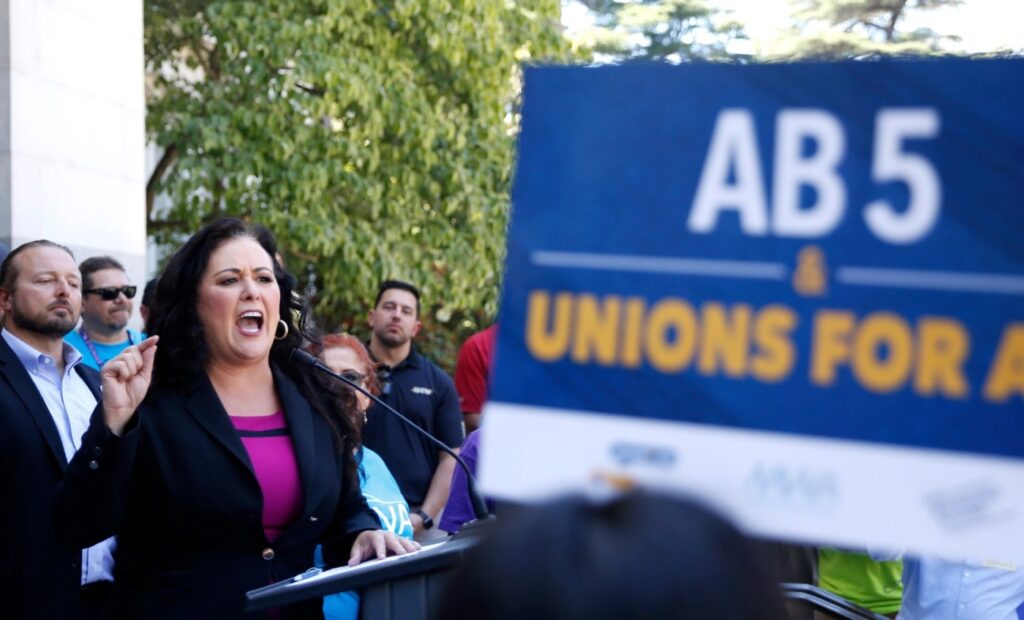
When Lorena Gonzalez Fletcher resigned from the Legislature last year to become the state’s top union official, it marked a new era of labor’s political influence in a state where just 17% of workers belong to unions.
While unions, particularly those representing public employees, have long been major players in the Capitol, thanks to being joined at the hip to its dominant Democrats, Gonzalez Fletcher raised labor’s ambitions and ramped up pressure on legislators to deliver.
The increased militancy this year coincided with a wave of strikes and threats of strikes in several California industries – most spectacularly film production. It also took advantage of having a governor, Gavin Newsom, who publicly aligned himself with unions’ political goals, and the advent of a new pro-union Assembly speaker, Robert Rivas.
When the gavel finally fell on the Legislature’s 2023 session last week, Gonzalez Fletcher and other labor leaders could crow about a bumper crop of union-sponsored bills.
The California Labor Federation, which she heads, counted passage of 13 bills it sponsored, including its top priority measure that extends unemployment insurance benefits to striking workers.
“Working people are fed up with wages that don’t keep up with the cost of living, with disrespect on the job, with growing corporate profits while families struggle to make ends meet,” Gonzalez Fletcher said in a statement. “Hot union summer isn’t ending – it’s endless. This is a new era of workers demanding to get what we deserve and it’s why we’re calling on the governor to sign these popular, pro-worker bills into law.”
The federation’s count didn’t include several other union-sponsored measures, including those that set new minimum wages for fast food and health care workers after compromises were negotiated with the affected industries. Nor does it count a union-backed constitutional amendment that would, if approved by voters, make it much tougher to impose new restrictions on tax increases, aimed at undercutting a 2024 business-backed ballot measure.
All in all, therefore, the boasting by Gonzalez Fletcher and other labor leaders is well justified by the results. The only question mark is whether Newsom will sign her top priority bill, extending unemployment insurance benefits to strikers.
The state’s Unemployment Insurance Fund, or UIF, which is supported by payroll taxes on employers, has about a $15 billion deficit because the state borrowed heavily from the federal government to keep benefit checks flowing during the downturn sparked by Newsom’s orders shutting down much of the state’s economy to battle COVID-19.
If the state doesn’t repay the loans, which is likely, the federal government imposes higher payroll taxes on employers to settle the debt.
Related Articles
It’s time for Americans to take the keys away from Joe Biden and Donald Trump
Sacramento demonstrates perils of a supermajority with slew of harmful bills
Judge Jim Gray: A proposal for serious immigration reform
What needs to be done about fentanyl?: Letters
The Biden impeachment investigation begins: Letters
Employers want a veto. Citing the UIF’s crushing debt, Newsom indicated last week that he’s skeptical.
“I think one has to be cautious about that before you enter the conversation about expanding its utilization,” Newsom said.
Given their spectacular success this year, one might wonder, where do Fletcher and other union leaders now go?
Previously, the Legislature had helped unions gain members by declaring home care and child care workers to be public employees and thus capable of being unionized. In fact, as the Legislature’s session was winding down, it approved a new contract for the latter that included hefty raises. Extending similar status to other service sectors is one possibility.
Meanwhile, the bills setting new minimum wages for fast food and health care workers would seem to open the door for similar efforts in other segments of the economy that have large numbers of employees with relatively low salaries.
With Gonzalez Fletcher at the helm, one can be certain that California unions won’t be content with this year’s wins.
Dan Walters is a CalMatters columnist.
